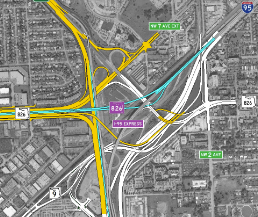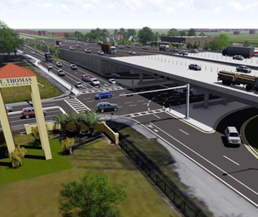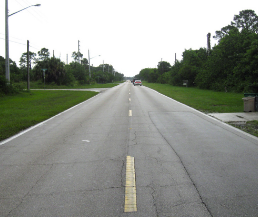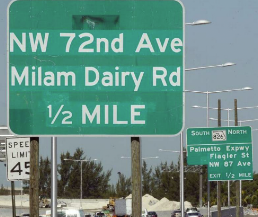- 9594 NW 41 Street Suite 201 Doral, FL 33178
Our MODAL DEVELOPMENT & TRANSPORTATION PLANNING group includes professionals with up to thirty‐five years of experience in the field whom have worked for the Florida Department of Transportation for most if not all of their careers prior to retirement from the state. We have provided office and in‐house support to District VI Public Transportation Office (PTO) office in all areas related to Rail, Transit, and Intermodal services including representing the Department at meetings such as the Annual Railroad Coordinators meetings.
This type of work involves transportation and transportation related planning activities in the broadest or most general way. Planning in this sub-category usually occurs at levels where difficult trade-offs in the use and allocation of resources must be made and where many people will be affected in important but often subtle ways. Hence, the ability to use judgement, both political and technical/professional, is very important, as is the ability to effectively communicate using a variety of media. Included in this sub-category are development and refinement of statewide transportation plans or plan components, and activities involving the determination of the impacts and implications of policies, legislative issues, processes, and standards on a wide variety of subjects, including: transportation facilities and services; land use; the environment; the private sector; and the public.
This type of work deals with planning for entire systems (one or several modes) of transportation covering an entire geographic area such as the development of long range transportation plans for an MPO, county, or region; or the development of an ITS Strategic Plan for a region. Included in this subcategory are activities involving the systematic analysis of future demand for transportation facilities and services, leading to recommendations for addressing that demand. Typical activities include: data collection and analysis, including analysis of transportation/land use relationships; estimation, forecasting, and assignment of travel demand, including modeling the characteristics and use of transportation systems; mode split and multimodal tradeoff analysis; development of ITS strategies; impact analysis; evaluation and decision making; cost analysis and financial feasibility; and modal coordination and management. Although recommendations as to the type, number, and approximate location of transportation facilities are to be made, this sub-category does not include determination of the precise location or design of facilities or systems.
This type of work deals with planning for entire systems or portions of systems (one or several modes) of transportation covering a smaller geographic area than Systems Planning or for a specific transportation corridor. Included in this sub-category are activities involving the systematic analysis of future demand for transportation facilities and services, leading to recommendations for addressing that demand. Typical activities, usually performed at a more detailed level than with systems planning, include data collection and analysis, as well as: analysis of transportation/land use relationships; estimation, forecasting, and assignment of travel demand, including modeling the characteristics and use of transportation systems; mode split and multimodal tradeoff analysis; development of ITS strategies to maximize the operation of the corridor; impact analysis; evaluation and decision making; cost analysis; and financial feasibility; and modal coordination and management. Although recommendations as to the type, number, and approximate location of transportation facilities are to be made, this sub-category does not include determination of the precise location or design of facilities or systems
This type of work involves planning and engineering in support of assessing the impacts that proposed transportation improvements may have on private property. Included in this sub-category are activities involving site analysis for compliance with comprehensive plans, local ordinances, and appraisers’ cost to cure; reviewing and providing engineering opinions of site plans for feasibility and conformance with applicable codes and regulations; assessing the impact to drainage and environment; and preparing site plan and studies which may encompass parking layout, vehicle use areas, and general site consideration in conformance with applicable codes, laws, and regulations.
This type of work involves data collection, analysis, editing, processing, and reporting to support planning, design, and maintenance of the transportation network. This type of work also involves the construction, replacement, or repair of traffic monitoring equipment including sensors (either installed in, or along the roadway) and associated equipment and appurtenances. The construction of traffic monitoring sites may include design, preparing construction plans, writing specifications, and construction engineering supervision. Special traffic counts may also be performed under this activity to support production and development activities and special needs.

SR 826 to NB I-95 Ramp Connector

Signalization & Lighting

Signalization & Lighting

Signalization & Lighting

SR 826 to NB I-95 Ramp Connector

Signalization & Lighting

Signalization & Lighting

Signalization & Lighting


Copyright © 2025— CHP Engineers & Surveyors. All Rights Reserved